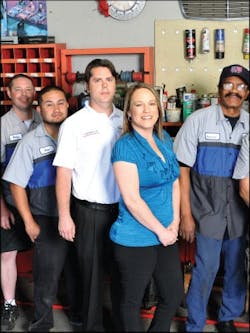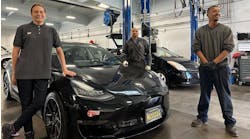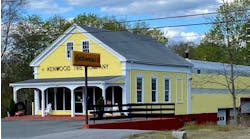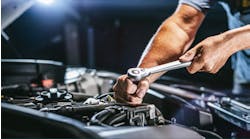Peter Gaal says that European vehicles have always been his bread and butter. His parents emigrated from Europe, his godfather owned a foreign car repair shop, and he spent most of his years as a technician working on European makes.
He knows European vehicles. He knows the customers who own them. And he knows what type of high-end service they expect.
Above all, it’s about quality.
“European car owners expect meticulous service and for their car to last longer than any American car,” Gaal says. “They request a certain type of service or an ambiance that comes with a European car.”
So when Gaal opened his own shop, Euro Automotive in Dallas, he set out to create a business that differentiated itself from all other independent operations in the area, positioning his shop as the true dealership alternative. And in order to be considered the true expert shop, Gaal knew that he needed to assemble an expert team.
Gaal started a recruitment process that relied heavily on word-of-mouth referrals and focused on landing technicians with diverse backgrounds. It led to a unique team that includes a former BMW racing technician, a Mercedes dealership veteran, and a former British Navy tech with experience with Rolls Royce, Bentley, and Aston Martin vehicles.
And it all helped Gaal transform his six-bay shop into a $1.5 million industry standard.
Using Word-of-Mouth Referrals
Gaal started his career at his godfather’s foreign car repair shop in eastern Texas, before he and his brother, George, opened Euro Automotive in 2001 in Dallas.
Shop growth was slow at the start. He had to accept work on all makes and models to keep the business going. But he knew that capturing a large market share of European vehicles provided his shop with a niche that it could expand and flourish.
Gaal set out to find a team of technicians who were experts in European cars, but finding qualified technicians proved difficult.
He tried the traditional routes—he posted job listings and conducted a standard interview process with candidates, but Gaal still felt restricted by the limitations of his local talent pool. The best techs were already employed, and those searching for work didn’t meet his new high standards.
He wanted the best, and he knew they were out there. The problem wasn’t the workforce; it was his methods for finding them.
Gaal started to reach out through other avenues for technicians. He looked to the people who are in and out of the best shops in the industry. He asked for referrals from tool representatives, vendors, colleagues and former employees. He also told them he would consider any candidates they knew of outside of the Dallas-Fort Worth area.
He also began to narrow his criteria for optimum candidates. For Gaal, it all came down to experience. He looked for people with the same passion, knowledge, training and experience working on European vehicles.
“I get a lot of clients from the dealer because they don’t understand that just because you take the car to the dealership, [that doesn’t mean] you won’t have a 20-year-old kid working on the car, not a master BMW or Mercedes technician,” he says.
Then Gaal found Henderson Doughty, a former technician for the British Navy and an expert on Jaguar, Aston Martin and Rolls Royce.
Recruiting Talent
Doughty was nearing the end of his term in the British Navy, and was considering career options, when a friend of his—who was familiar with Gaal’s shop from his time working in the Dallas-area repair industry—told him about Euro Automotive.
Doughty was considering a move stateside, and from what he heard of Gaal’s shop, he thought it would be the right fit.
Gaal wanted experienced, highly trained technicians, and he knew that if he wanted to recruit those types of employees, he needed to promote an atmosphere where quality and precision work were at the forefront of everything they did. Being an independent shop gave him an advantage, Gaal says, allowing his shop to run devoid of any possible dealership or corporate politics—but not at the expense of financial backing. That’s why he emphasized his investments in top-of-the-line equipment, his above average pay (on a salary-plus-commission system) and regular training in his recruiting pitch.
Gaal’s drive stuck out to Doughty and he reached out about working at the shop.
Doughty received all of his Jaguar and Rolls Royce training in London, where the Navy would frequently send technicians to receive factory training.
“You get an idea of the mind set and the way they do things,” Doughty says. “It helps because you learn things that might be harder for another mechanic because they’re not familiar with how the manufacturer does things.”
Gaal says he immediately recognized the expertise that Doughty would bring to the shop and worked with Doughty to secure a visa and bring him on board.
Hiring the Right Person
Finding high-level techs isn’t always that simple as it was with Doughty, though, Gaal says.
He also relied on his wife, Teila, who had 15 years experience supervising 52 employees for a credit card processing company. Now a part of the shop’s front office, she helped refine his recruitment process.
“I’ve gone through many, many résumés,” Teila says. “The résumé doesn’t always tell you what you’re looking for.”
First, Teila says she relies heavily on background checks and references.
“Definitely contact the references,” she says. “Call people to make sure they’re thorough. Why did they leave this job? If they’re switching around jobs a lot, there’s got to be a reason they’ve left so many jobs. You can tell a lot within the first five minutes of talking to somebody.”
Next, after narrowing down the candidates, Gaal says he will hire the technician on a temporary basis, and give them a two-week trial period where they can work to full-time employment.
“You can tell how well they gel with the team,” he says. “You can tell how they come together and see if they’re going to be the right fit. I try to give somebody the benefit of the doubt, but that’s why I have a trial period.”
Also, a technician agreeing to the trial period demonstrates their commitment to becoming a part of that organization.
Teila says the trial period is also a way to assess their level of training and knowledge.
“We get jobs in here that aren’t just an oil change,” she says. “We get jobs that are pretty decent jobs that are going to take a knowledgeable mechanic. You will know in a couple weeks if they can fix it or not.”
Keeping the Right Person
With Doughty on board, Gaal landed two more top-shelf technicians—one a former member of a BMW racing team and the other a 10-year veteran of local Mercedes dealerships.
Each brought on a new level and area of expertise, and, coupled with the shop’s three other master techs, Gaal had finally built the team he desired.
That team has helped Gaal double revenue since 2010, going from $750,000 in sales to $1.5 million in 2014. The shop’s average repair order has also climbed from $659 in 2010 to $925 in 2014, a more than 40 percent increase.
But bringing in top talent is only half the process. Once in the shop, Gaal wanted to ensure he kept them there.
Part of that comes down to pay, workload and work mix.
More than anything, though, Gaal retains his high-performing staff through a focus on new technology and training.
He created his own in-house training seminar by bringing over English technicians who work on high-end vehicles to work with the shop and teach technicians about new vehicle technology.
Gaal says he found those technicians through his cousin, who works for a manufacturing company in Hungary and often does training with high-end auto manufacturers. Gaal sets up the work visas, pays for the flights and the time the technicians spend in the shop.
He says that he typically tries to have two English technicians come twice a year for two weeks at a time. While there, the technicians work directly alongside his team, as well as hold seminars focusing on one part of the vehicle. Last year, for example, they focused on the electrical systems.
“It’s definitely beneficial because they know what they’re working on,” he says. “The cars that we consider a luxury here is their Chevrolet over there. It’s a tool to help us get familiar because every car is so different.”
Besides the in-house training, Gaal says the shop staff also attends training through OEMs, parts vendors, and receives support from their Autologic scan tool maker.
Being an independent shop can provide challenges when it comes to staying on the cutting edge, but Gaal doesn’t want to use that as an excuse. He’s built a business based on expertise. He has the staff in place now to service his customers in the way they are accustomed to in a dealership experience.
And a growing customer base is positioning his shop to expand in the future.
“It keeps people excited to know they’re working with a shop that is moving forward and wants to keep up with the times,” he says.



